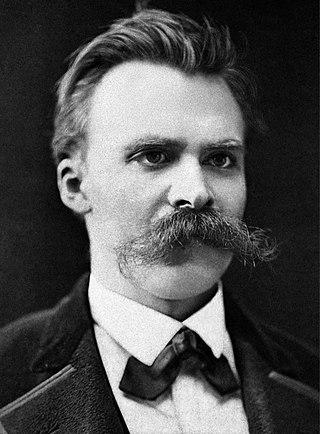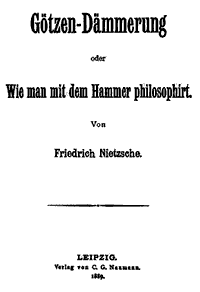Related Research Articles

In philosophy, empiricism is an epistemological view that holds that true knowledge or justification comes only or primarily from sensory experience. It is one of several competing views within epistemology, along with rationalism and skepticism. Empiricism emphasizes the central role of empirical evidence in the formation of ideas, rather than innate ideas or traditions. However, empiricists may argue that traditions arise due to relations of previous sensory experiences.

Friedrich Wilhelm Nietzsche was a German philosopher. He began his career as a classical philologist before turning to philosophy. He became the youngest person to hold the Chair of Classical Philology at the University of Basel in 1869 at the age of 24, but resigned in 1879 due to health problems that plagued him most of his life; he completed much of his core writing in the following decade. In 1889, at age 44, he suffered a collapse and afterward a complete loss of his mental faculties, with paralysis and probably vascular dementia. He lived his remaining years in the care of his mother until her death in 1897 and then with his sister Elisabeth Förster-Nietzsche. Nietzsche died in 1900, after experiencing pneumonia and multiple strokes.
Materialism is a form of philosophical monism which holds that matter is the fundamental substance in nature, and that all things, including mental states and consciousness, are results of material interactions of material things. According to philosophical materialism, mind and consciousness are by-products or epiphenomena of material processes, without which they cannot exist. Materialism directly contrasts with idealism, according to which consciousness is the fundamental substance of nature.
Objectivism is a philosophical system developed by Russian-American writer and public philosopher Ayn Rand. She described it as "the concept of man as a heroic being, with his own happiness as the moral purpose of his life, with productive achievement as his noblest activity, and reason as his only absolute".
The Übermensch is a concept in the philosophy of Friedrich Nietzsche. In his 1883 book, Thus Spoke Zarathustra, Nietzsche has his character Zarathustra posit the Übermensch as a goal for humanity to set for itself. The Übermensch represents a shift from otherworldly Christian values and manifests the grounded human ideal.

Thus Spoke Zarathustra: A Book for All and None, also translated as Thus Spake Zarathustra, is a work of philosophical fiction written by German philosopher Friedrich Nietzsche; it was published in four volumes between 1883 and 1885. The protagonist is nominally the historical Zoroaster.

Richard McKay Rorty was an American philosopher. Educated at the University of Chicago and Yale University, he had strong interests and training in both the history of philosophy and in contemporary analytic philosophy. Rorty's academic career included appointments as the Stuart Professor of Philosophy at Princeton University, Kenan Professor of Humanities at the University of Virginia, and Professor of Comparative literature at Stanford University. Among his most influential books are Philosophy and the Mirror of Nature (1979), Consequences of Pragmatism (1982), and Contingency, Irony, and Solidarity (1989).
In metaphysics, phenomenalism is the view that physical objects cannot justifiably be said to exist in themselves, but only as perceptual phenomena or sensory stimuli situated in time and in space. In particular, some forms of phenomenalism reduce all talk about physical objects in the external world to talk about bundles of sense data.

Karl Theodor Jaspers was a German-Swiss psychiatrist and philosopher who had a strong influence on modern theology, psychiatry, and philosophy. After being trained in and practising psychiatry, Jaspers turned to philosophical inquiry and attempted to discover an innovative philosophical system. He was often viewed as a major exponent of existentialism in Germany, though he did not accept the label.

Transcendental idealism is a philosophical system founded by German philosopher Immanuel Kant in the 18th century. Kant's epistemological program is found throughout his Critique of Pure Reason (1781). By transcendental Kant means that his philosophical approach to knowledge transcends mere consideration of sensory evidence and requires an understanding of the mind's innate modes of processing that sensory evidence.

Modern philosophy is philosophy developed in the modern era and associated with modernity. It is not a specific doctrine or school, although there are certain assumptions common to much of it, which helps to distinguish it from earlier philosophy.
Eternal return is a philosophical concept which states that time repeats itself in an infinite loop, and that exactly the same events will continue to occur in exactly the same way, over and over again, for eternity.
"God is dead" is a statement made by the German philosopher Friedrich Nietzsche. The first instance of this statement in Nietzsche's writings is in his 1882 The Gay Science, where it appears three times. The phrase also appears in Nietzsche's Thus Spoke Zarathustra.
The fact–value distinction is a fundamental epistemological distinction described between:
- Statements of fact, based upon reason and physical observation, and which are examined via the empirical method.
- Statements of value, which encompass ethics and aesthetics, and are studied via axiology.

Twilight of the Idols, or, How to Philosophize with a Hammer is a book by Friedrich Nietzsche, written in 1888, and published in 1889.
Amor fati is a Latin phrase that may be translated as "love of fate" or "love of one's fate". It is used to describe an attitude in which one sees everything that happens in one's life, including suffering and loss, as good or, at the very least, necessary.
T. K. Seung was a Korean American philosopher and literary critic. His academic interests cut across diverse philosophical and literary subjects, including ethics, political philosophy, Continental philosophy, cultural hermeneutics, and literary criticism.

Ontopoetics is a philosophical concept that involves the communicative engagement of self with the world and the world with the self. It is also described as a "poetic order" that unfolds alongside the "causal order" in the process of the communicative engagement with reality and participating in it. It includes the perception of cues or signals, or the expression of actors, as well as "the construction of impressions on re-actors by the deliberate choice of attractive signifiers that communicate factual or illusory realities".
Anschauung is a German concept that is usually translated as "intuition". It, however, connotes a more nuanced definition especially when the concept is applied to philosophical discourse, including quantum theory. Some of the translations include actual, sense impressions, contemplation, view, opinion, and notion. Anschauung is also an important component of Johann Gottlieb Fichte's doctrine of knowledge.
References
- 1 2 3 Del Caro, Adrian (2004). Grounding the Nietzsche Rhetoric of Earth. Berlin: Walter de Gruyter. p. 94. ISBN 3-11-018038-3.
- ↑ Magnus, Bernd; Stewart, Stanley; Mileur, Jean-Pierre (2014). Nietzsche's Case: Philosophy as/and Literature. Oxon: Routledge. ISBN 978-1-317-96098-0.
- 1 2 Burnham, Douglas (2010). Nietzsche's Thus Spoke Zarathustra: An Edinburgh Philosophical Guide: An Edinburgh Philosophical Guide. Edinburgh: Edinburgh University Press. p. 104. ISBN 978-0-7486-4243-4.
- 1 2 Stack, George J. (2005). Nietzsche's Anthropic Circle: Man, Science, and Myth. Rochester, NY: University Rochester Press. p. 103. ISBN 1-58046-191-3.
- ↑ Metcalfe, Michael. A Dancer’s Virtue: Human Life in Light of Nietzsche’s Eternal Recurrence. Concept XXVIII, 2005.
- ↑ Higgins, Kathleen Marie (2010). Nietzsche's Zarathustra. Lanham, MD: Lexington Books. pp. 80–81. ISBN 9780739120866.
- 1 2 3 Dorpat, Theo L.; Miller, Michael L. (2013). Clinical Interaction and the Analysis of Meaning: A New Psychoanalytic Theory. Oxon: Routledge. p. 6. ISBN 978-0881631463.
- ↑ Schimek, Jean-Georges (2011). Memory, Myth, and Seduction: Unconscious Fantasy and the Interpretive Process. Taylor & Francis. p. 142. ISBN 978-1-135-19189-4.
- 1 2 Nesselroade, K. Paul Jr.; Grimm, Laurence G. (2018). Statistical Applications for the Behavioral and Social Sciences. Hoboken, NJ: John Wiley & Sons. p. 247. ISBN 978-1-119-35539-7.
- ↑ Germain, Gil (2017). Thinking about Technology: How the Technological Mind Misreads Reality. Lanham, MD: Lexington Books. p. 59. ISBN 978-1-4985-4953-0.